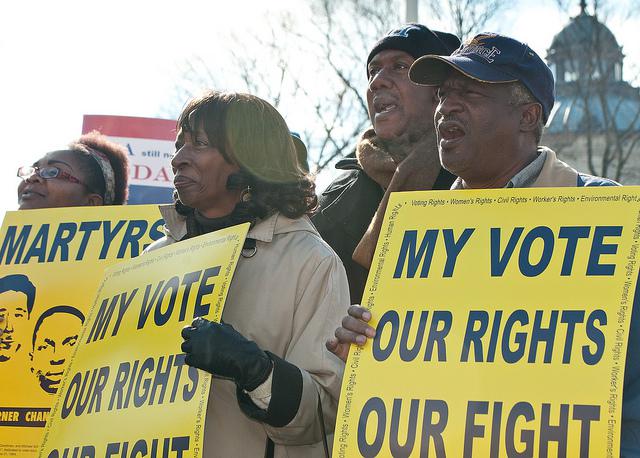This past Saturday was the 51st anniversary of signing of the historic Voting Rights Act (VRA). It was signed into law in 1965, by President Lyndon Johnson, with bipartisan support. The Voting Rights Act outlawed discriminatory and racist voting restrictions, such as literacy tests and poll taxes, that were established in the South soon after the Civil War to deliberately make it harder, and in some cases impossible, for African Americans to vote.
While we are celebrating this historic civil rights victory, unfortunately the power of the VRA has been limited. The 2016 election will be the first election without the full protection of the VRA. In 2013 the Supreme Court gutted a key provision of the VRA. States that had a long history of intentionally suppressing the vote of African Americans and all communities of color, no longer had to have their state voting laws approved by the Department of Justice. Within hours of the Supreme Court’s decision, states with a long history of discrimination passed sweeping laws that limited entire communities from accessing the ballot box.
But recently, we had some good news. In the last two weeks, courts have struck down six different restrictive and racist voting laws. Laws in North Carolina, Michigan, Texas, Wisconsin, North Dakota and Kansas. All of these laws had been put in place by Republican-controlled legislatures and targeted African-American voters, Latino voters, college students, and low-income Americans.
In North Carolina, a federal court struck down the state’s restrictive voter ID law that unfairly targeted African Americans and college students. The court also reestablished an entire week of early-voting, allowed for same-day voter registration and out-of-precinct voting, and assured that young people could pre-register to vote.
Both Texas and Wisconsin experienced victories limiting their strict voter ID laws. Under Texas’ voter ID law, almost 600,000 Texans did not have the proper ID to vote. You could use a gun license to vote, but not a university-issued college ID. In Wisconsin, a federal court ordered that student IDs were considered legitimate identification when voting and, if no identification could be obtained before the elections, voters are allowed to sign an affidavit.
Whether it’s a young person in North Carolina or a college student in Texas, every person deserves the right to vote and the right to clean air and water. Sadly, many of the same low-income communities of color that are targeted with voter suppression tactics are simultaneously impacted by environmental injustice. They are often home to disproportionate environmental hazards such as toxic waste sites, landfills, coal plant emissions and their consequent health risks. To make matters worse, many of these communities lack job opportunities, quality education, and tend to be targets of racial profiling and police brutality. By restricting the people of these communities access to the ballot box, their voices are being silenced. Their ability to stand up to these other injustices and call on their elected officials to protect their families and communities is restricted.
For the last three years, the Sierra Club has mobilized our 2.4 million members and supporters alongside our allies at the NAACP and across the civil rights community, organized labor, and a swath of organizations calling on Congress to reauthorize and strengthen the Voting Rights Act. While our federal courts have taken action to strike down some of the most discriminatory and racist voting laws, there are still 15 states with new voting restrictions in place for November. Plus, the landscape will continue to change as challenges move up through various courts. We need a strong Voting Rights Act now more than ever. Join us in demanding Congress take action. Sign the petition here.
